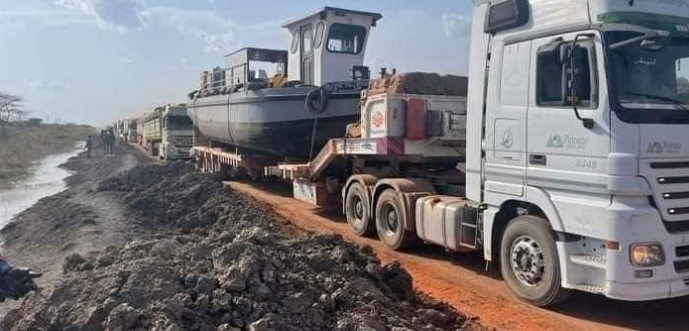Officials from several government ministries, including the office of the president, and Unity State officials have publicly contradicted each other on the arrival of equipment for the project to dredge and clear vegetation in tributaries of the River Nile.
On Wednesday, the Unity State minister of physical infrastructure, lands, housing, and public utilities, Lam Tungwar Kueiwong, confirmed the arrival of machinery from Egypt to dredge and open River Naam and said the project was blessed by the national ministry of irrigation and water resources in Juba.
“The project is under the ministry of water and irrigation of the national government in Juba and we, the state, are just beneficiaries because we have had flooding so we are the ones being rescued,” he said. “We do not know when it (work) will start but we have already received the machines based on the directives from the national government.”
He added: “We are the people on the ground but the original owners of the project are the national ministry of water and irrigation.”
However, in a twist of events, the national environment minister, Josephine Napwon, declared the project to dredge and clear River Naam of aquatic vegetation illegal and vowed that it would not commence without an environmental impact assessment being carried out.
She told the press on Wednesday that the ministry of water resources and irrigation has not yet notified her (environment) ministry of the project.
“We in the (environment) ministry are not aware of this development and we also saw the equipment on social media but we did not even know what the equipment is meant for until we saw that it is for the dredging of the Nile,” Minister Napwon said.
Interestingly, the press secretary in the office of the president, Ateny Wek Ateny, told a local media outlet on Tuesday that President Salva Kiir was not aware and had never been notified about the arrival of the river dredging machinery and or the project.
“The government has not given any approval yet on clearing Nile waters or clearing the plants that are inside the Nile. We have not yet been told about those machines completely,” Wek is quoted as saying. “The government wanted to know from the experts the ecological impact of clearing the Nile because livelihoods depend very much on the swamps.”
He said the government has invited eminent foreign and local scholars and experts to debate and give an opinion on the matter.
“The government of South Sudan is responsible and always does things after studies and it cannot do things without studies that show the benefit will not outwit the negative impact,” Wek said. “Any decision about the Nile waters will be a collective decision and will not be a unilateral decision by the government.”
Not to be left out, the ministry of water resources and irrigation, through Gattiek Gatkuoth Wichar, the press secretary in the minister’s office, on Wednesday afternoon said they were just implementing a bilateral agreement and memorandum of understanding that was signed between Egypt and South Sudan.
“The Ministry of Water Resources and Irrigation has learned that there is an on going public misconception about the recently imported equipment that were received by Unity State government last week for clearing out weeds and sediments impeding the movement of water in Naam River,” the statement read. “Therefore, it is crucial to give you a brief backdrop on bilateral cooperation between South Sudan and the Arab Republic of Egypt in the field of water.”
According to the spokesperson, the cooperation between the two countries dates back to the pre-colonial era when Egypt and Britain, on behalf of the downstream countries, signed the 1929 Nile Water Agreement which was renewed in 1959. He said that after the Comprehensive Peace Agreement (CPA) of 2005, the water ministries of the two countries established cooperation by signing a Memorandum of Understanding (MoU).
“The (MoU) sets out key areas of cooperation namely: Capacity building of water cadres in Egyptian institutions; Dredging and clearance of aquatic weeds in the Bahr el Ghazal Basin and construction of landing sites,” it added. “Provision of safe drinking water through the drilling of boreholes and motorized solar systems and carrying out a feasibility study for Sue Multi-purpose Dam in Western Bahr el Ghazal State.”
The statement said that work on the aforementioned activities started but was halted by the conflict of 2013 and 2016 where all the equipment and tools mobilized for dredging and clearance of aquatic weeds were vandalized in Bentiu.
Gatkuoth said that during the first session of the Joint High-Level Commission between Egypt and South Sudan led by the Vice President James Wani lgga in July 2021, the water ministry renewed and signed an MoU with the Egyptian water ministry to dredge the Bahr el Ghazal basin, construct four haffirs and urgently resume the dredging of the 30 km stretch of Bahr el Ghazal from the Unity State capital Bentiu to Lake No.
“The opening up of this stretch of river is to allow smooth navigation of petroleum products and other economic activities along rivers from the refinery to Juba,” he wrote. “In this regard, the ministry of water resources and irrigation has been following closely with its counterparts in Egypt and facilitating the process in Sudan to ensure that the equipment and tools for dredging and clearance of aquatic weeds arrive in Bentiu safely.”
Gatkuoth said 21 trucks loaded with equipment and tools arrived in Bentiu on 1 June from Egypt via Sudan.
“However, there is a negative propaganda being circulated on social media and other media outlets by prominent personalities against this initiative who went further by calling for actions to stop the ongoing project,” he said. “These river-maintenance exercises have not been taking place for years, sediments have accumulated and aquatic vegetation has overgrown, and therefore both need to be cleared for the health of the river system.”




